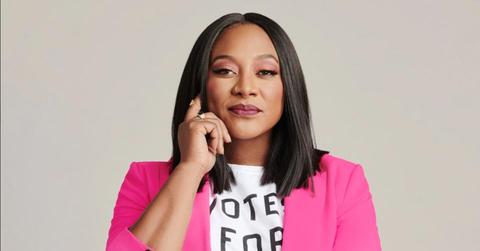Alicia Garza On 3 Ways To Overcome Rejection

Alicia Garza is the Principal at Black Futures Lab, a mission to elevate Black political power. As co-creator of the Black Lives Matter Global Network, Garza believes that Black communities deserve what all communities deserve — to be powerful in every aspect of their lives.
Since the start of the movement in 2013, Black Lives Matter has been nominated for a Nobel Peace Prize, as the world recognizes the groundbreaking work Alicia and her co-founders started.
In the podcast episode Skimm’d From The Couch, Garza uncovers her tips for building relationships, overcoming rejection, and how she stays invigorated in the tough field of advocacy work. She also shares how she has become a better organizer, advocate, and campaigner throughout the years emphasizing how hashtags don’t start movements — people do.
Garza’s Secrets To Building Relationships
When Garza was a young teenager, she started working with the School of Unity and Liberation (SOUL). Through the program, she learned how to talk to people and how to turn a no into a yes. She explains many people were suspicious and hostile towards her, but it became her mission to help someone see their own power when they thought nothing is possible.
When door-knocking during campaigns, Garza explains that the “secret sauce” to organizing are the relationships in real-time. It connects people in vulnerable times, helping people know they’re not alone, and making decisions to be louder about things that people want to be changed and bring into existence. “You have to build the kinds of alliances that are unexpected. You have to build [them] between people who might think they don’t have anything in common” Garza states in reference to putting power in the people.

Tips For Overcoming Rejection
1.Understanding a person’s “why.”
Garza shares a story during her time as a youth organizer. A woman constantly slammed a door in her face when she came to the campaign. “The key was to understand why this woman was slamming the door in my face as opposed to getting into my feelings about why she rejected me,” Garza says. “It wasn’t ever about me. Her no was rooted in fear of retaliation, attack, taking a risk, and not getting what you want. People have so many reasons for doing what they do. We are wrapped in the stories of how the world has impacted us, and how we long to impact the world. Sometimes that creates conflict.”
2.Empathy and Pivot
Garza says you have to build a relationship with someone like the woman who slammed a door in her face. “Someone has to see you and what you long for. We are looking for people who are looking for us but may not know they are looking for us. There are no yellow pages for activism,” Garza explains.
3. Breaking down barriers and listening
Advocacy work is being scientific with people, and it is not linear. Garza explains it is a commitment to move through a process with people, and a constant effort to know-how, and what to listen for the growth of a movement.
Staying Invigorated In Advocacy Work
Taking care of her spirit and wellness is survival. With the COVID-19 pandemic being a mental stressor on so many, Garza explains that riding her road bike every morning keeps her present. She sees a therapist once a week, and says “cooking recipes are pathways to unlock a thing.” When it comes to spending years in advocacy work, Garza reminds listeners there is a lot of chatter of people wanting you to do what they want. “It is important to hone your craft of understanding what you know and what you don’t know. Part of what I feel more open to (now) is what we are building versus what it is we are dismantling.” Saying “NO” to things that are not in her path is part of Garza’s ways she keeps her movements growing.
Listen to the full podcast below:






